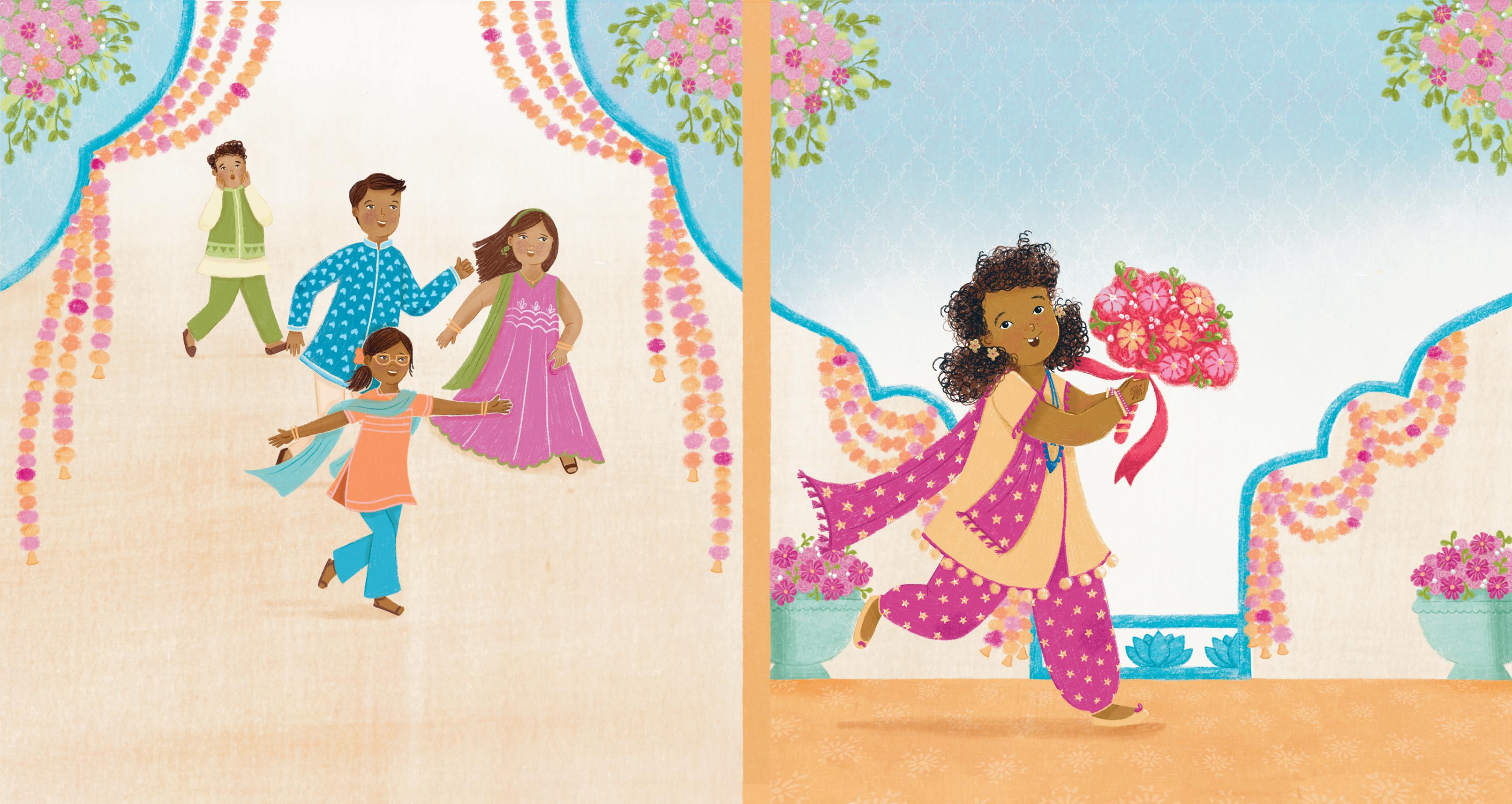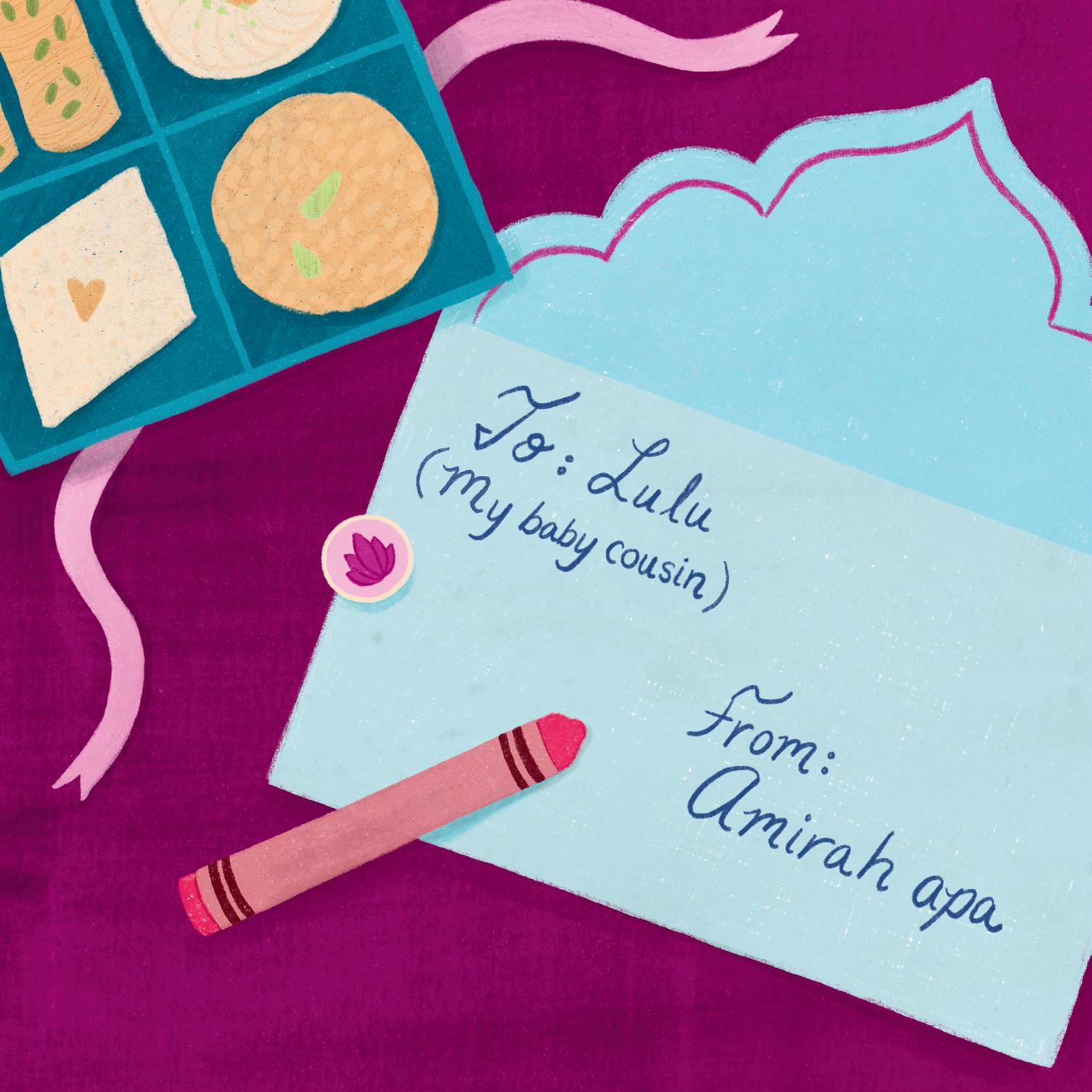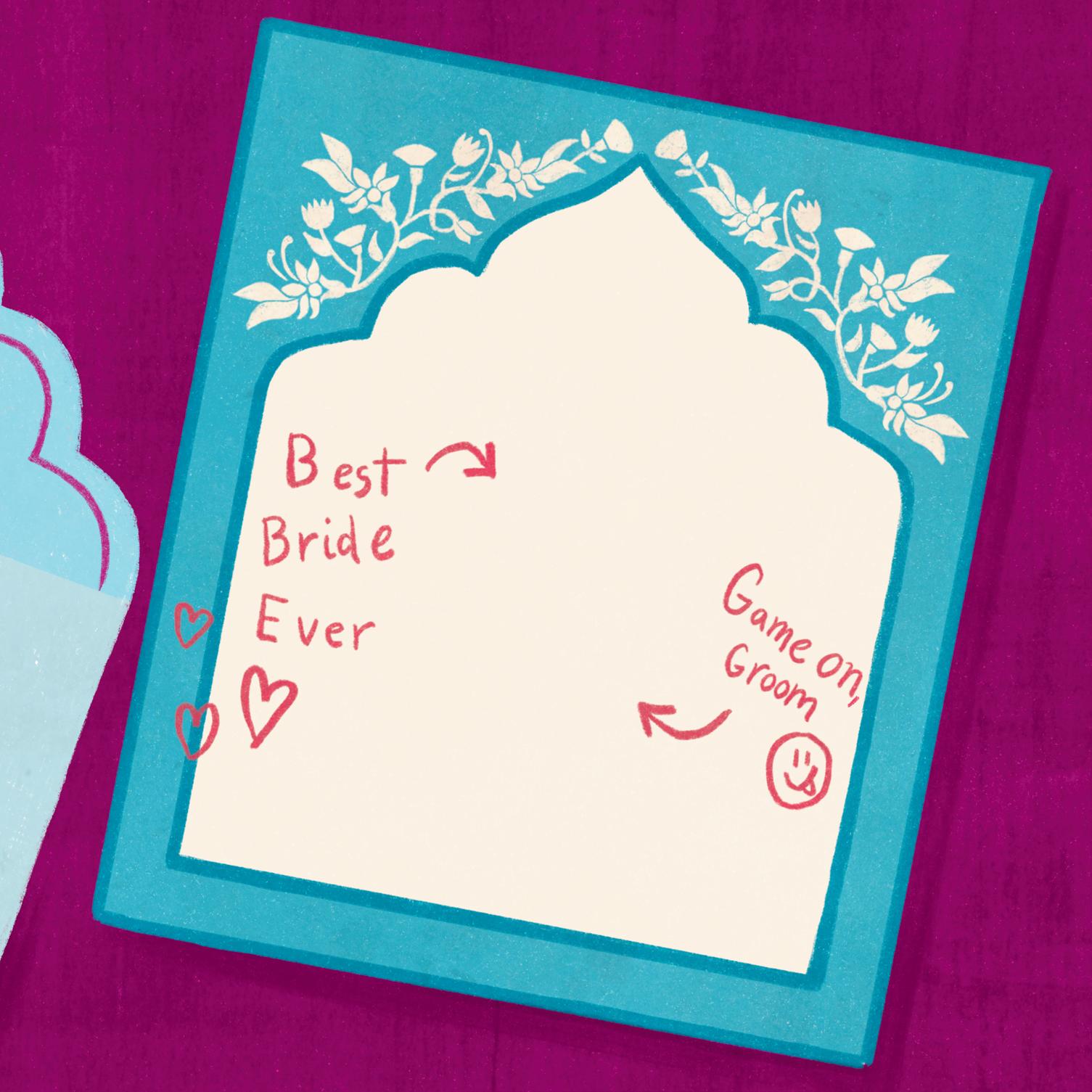Lulu in the Spotlight
A South Asian Wedding Story

BY NATASHA KHAN KAZi





BY NATASHA KHAN KAZi



INVITE YOU TO THEIR MEHNDI PARTY AND WEDDING

Versify is an imprint of HarperCollins Publishers.
Lulu in the Spotlight
Copyright © 2025 by Natasha Khan Kazi
All rights reserved. Manufactured in Italy.
No part of this book may be used or reproduced in any manner whatsoever without written permission except in the case of brief quotations embodied in critical articles and reviews. For information address HarperCollins Children’s Books, a division of HarperCollins Publishers, 195 Broadway, New York, NY 10007. www.harpercollinschildrens.com
Library of Congress Cataloging-in-Publication Data
[TK]
Library of Congress Control Number:
ISBN 978-0-35-873220-4
The artist used watercolor textures, pencil, and digital pencil to create the illustrations for this book. 25 26 27 28 29 RTLO 10 9 8 7 6 5 4 3 2 1
First Edition


“Balle! Balle!”
The speakers boomed. “Ooh, aah!”
Everyone admired the henna art on the bride’s hands. “Uri baba!”
Friends and family clapped in sync to celebrate.

No one noticed Lulu scheming.
Weddings, Lulu decided, were good for one thing . . . prize money.

She even liked Sameer, the groom. But tomorrow his family would be the opponent in the wedding games.
Lulu remembered everything from the family weddings last year:

1.Blockthegroom’sentrance. 2.Getentrancefee. 3.Stealthegroom’sshoes. 4.Returntheshoesfor money,andwinfame andfortune!
Seven-year-old Lulu was ready. There was just one problem . . .
Lulu’s older cousins thought they didn’t need her help.

Tarek was eleven and charming enough to butter up the competition.
Nine-year-old Zara was clever enough to raise the entrance fee.
Her twin, Farah, was athletic enough to swipe the groom’s shoe during the ceremony. She had done it before.

They shimmied and sashayed into stardom at every wedding. This year is going to be different, Lulu thought.
On the wedding day, Lulu’s eyes sparkled like the sequins on her salwar.
“Can I help win the wedding games?” Lulu opened her eyes wide and puffed out her cheeks in a pout. This worked when she wanted to stay up for five more minutes.

“Just leave it to us big kids.” Tarek patted her head.

Lulu had a fire in her belly, and it wasn’t from the spicy samosas.

The dhol beats thundered through the streets. The groom’s family bounced toward the wedding hall.
“Chalo! Chalo!”
Lulu’s family rushed to the door. Friends, siblings, and cousins bumped shoulders as they packed together tightly like books on a shelf.

“Don’t forget the gate ribbon!”
Lulu shouted. Farah snatched the satin sash as she flew past Lulu.
Step one–block the groom’s entrance –was complete, without Lulu.

“I’lll pay if you answer this riddle,” Sameer said. “What has a tail and a head, but no body?”
“Pay the entrance fee, please!” Zara giggled.
Lulu’s brain began to tickle. But before she could answer, Zara shouted, “A coin!”

“Woo-hoo!”
The deal was struck!

Sameer’s little brother, Kamal—Lulu’s greatest opponent—shoved his way past her, leaving a trail of rice puffs. “Ha-ha-ha.”
Step two – get entrance fee –was complete, without Lulu.
It was almost time for the ceremony to begin!
“I feel like I am missing something,” Amirah said.
Lulu felt the familiar tickle in her brain when she unraveled a mystery.

“I know! Your bouquet.”
“Thank you, Lulu!” Amirah smiled.
Lulu’s cheeks flushed as pink as the peonies. The wedding games were not over. She still had a chance.

As their procession reached the stage, Lulu spotted the bag with the groom’s shoes.
I can be as fast as Farah, Lulu thought.

Lulu sped forward, but Kamal stuck out his foot.
“You’ll never steal the shoes!” Kamal and his cousins hooted and howled.



Lulu hid under Nani’s shawl. “Everyone helped with the wedding games except me. I never got a chance.”
“You will get your turn to shine, beta. Just do it your way.”
Nani’s hugs smelled like cloves and warm chai.
Lulu squeezed her grandma extra tight.
“Why do we even have the joota chupai tradition?” Lulu asked.
“Laughter helps two families become one big family,” Nani said.
“Now, where did I put my glasses?” Nani fumbled inside her purse.

“I saw them by the gifts!” Lulu ran to fetch them.
Whistles

“Mubarak ho!”
and waves marked the end of the ceremony.

Time was running out! Farah stretched her legs, and then, in a flash, she ran to the stage, ready to grab the shoes.
The shoes were not inside the bag! “Where did they hide the shoes?” Farah scrambled to find them.

“I can’t believe we took our eyes off them.” Zara hissed.
“Don’t blame me! You’re the brains of this operation.” Tarek shrugged.

That’s when Lulu noticed a clue on the stage.

Rice puffs!
Kamal had been munching on rice puffs. Where did I see the rice puffs before? Think, Lulu, think!
“I KNOW!”

Lulu darted to the gifts stacked near Nani.

Quickly, Lulu opened the box, and the shoes sparkled back at her.
“I did it!”

Step 3–steal the shoes –was complete, thanks to Lulu.
Amirah’s face glowed under her dazzling dupatta as she wrapped Lulu in a hug.
“May I have my shoes back?” asked Sameer, his eyes twinkling at Lulu.
“Once you pay up!” said Lulu, twinkling back.

Kamal unhappily handed over the prize money to Lulu.
“Mission accomplished!” Zara nodded to Lulu.
Tarek and Farah counted the money.

Lulu’s heart burst with pride.
Step 4– win fame and fortune —Check!

Then Lulu noticed Kamal slumped like soggy bread pudding.
How do we become one big family if only one side wins? Lulu wondered.

She walked over to Kamal.
“Let’s use the prize money for an ice cream party for all the kids.” Kamal’s eyes lit up.
Step 5– Do it my way —Check.
Lulu’s family is a member of the South Asian diaspora, which means South Asian communities living outside of the Indian Subcontinent. The Indian Subcontinent has diverse wedding traditions based on religion, language, and region. South Asian diaspora communities celebrate a variety of traditions, old and new. ulu’s family is a member of the South Asian diaspora, which means South Asian communities living outside of the Indian Subcontinent. The Indian Subcontinent has diverse wedding traditions based on religion, language, and region. South Asian diaspora communities celebrate a variety of traditions, old and new.
MEHNDI OR HENNA CEREMONY: Applying mehndi, or henna, application to the bride’s hands and feet, as well as on the hands of female friends and family.
FRIENDS AND FAMILY PERFORMANCES: Performing songs, dances, and skits to commemorate the upcoming wedding.
THE BARAAT (IN HINDI/URDU): With fanfare, dancing, and music, the groom’s family processes to the wedding venue.
HOLDING THE GATE: During the gate tradition, the bride’s friends and young family members playfully form a line to create a human barrier at the entrance of the wedding venue. They request an entrance fee, and the groom’s family playfully negotiates but ultimately offers a gift. This gift symbolizes their affection for the children in the bride’s family.
STEALING THE SHOE OR JOOTA CHUPAI (IN HINDI/URDU): Joota chupai, which means “hiding the shoes,”is a wedding tradition within several South Asian communities. Young people from the bride’s side of the family playfully steal the groom’s shoe for ransom, money in exchange for the stolen item. After the groom pays the ransom to the bride’s family, the shoe is returned. The ransom money is traditionally divided between the young family members on the bride’s side. The joota chupai tradition shows both sides of the family are ready for a lifetime of laughter and fun.

DHOL: A large, barrel-shaped wooden drum, typically two-headed, used in South Asia.
DUPATTA: Hindi word for veil, typically made from taffeta or silk.
MUBARAK HO: An Urdu phrase that translates to “Congratulations.” Mubarak is derived from the Arabic, and “Ho” is the Urdu verb form.
SHAVA SHAVA: A popular Punjabi phrase used in celebratory context while dancing. Though it does not have a precise meaning, it serves as a call to rejoice.
SHONA: In Bengali, “Shona” is a term of endearment used to express affection to someone. It can be translated to “darling” “sweetheart.” The Bengali word means golden.
THARATHARI: Means quickly or swiftly in Bengali.
URI BABA: In Bengali, “Uri Baba” is an idiomatic expression typically used to convey astonishment. It can be translated to “Oh my!” or “Goodness gracious!”



